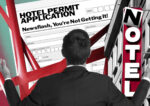At a time when available hotel rooms are hard to come by, New York City’s new rules for short-term rentals like those on Airbnb and Vrbo are likely to push hotel booking rates higher.
In July, nearly 9 out of every 10 hotel rooms were sold every night, according to research firm STR.
“Occupancies are already pretty healthy,” said STR’s Jan Freitag. “What that means is that hotels would have more pricing power. If there is less supply and the same amount of demand, you can assume that room rates are going to go up.”
The average daily room rate for the first seven months of the year was $264, Frietag said, up about 8 percent from a year ago. The return of tourism travel, plus the city’s use of hotels as migrant and homeless shelters have helped with the recovery.
And after more than a decade of bemoaning what they saw as unfair competition from platforms like Airbnb, the Big Apple’s hoteliers could finally see some of the demand they’ve ostensibly lost.
On Tuesday, new regulations went into effect that require hosts to register with the city in order to share their homes on short-term rental platforms for 30 days or less. The exact number of hosts who rent homes as unlawful hotel rooms is debated, but the new rule registry is expected to curtail a significant number of listings.
There were about 23,000 “active listings” on short-term platforms in July — meaning those that had been rented in the previous month, according to the data firm AirDNA.
But about 40 percent of those were for shared or private rooms that are allowed as long as the host is present, the company’s figures show. Another 15 percent were for homes with minimum stays of 28 nights or more and 10 percent were for hotels or serviced apartments that could be zoned for transient lodging.
That leaves about 7,500 listings that could be affected by the new regulations, according to AirDNA’s figures. Of those, about 3,500 had fewer than 20 reviews, which AirDNA said may indicate that they’re either new or rented infrequently.
“Of the roughly 4,100 listings left, after removing all those mentioned above, the vast majority of these listings are available full-time and generate around 40 percent of the revenue earned in the market,” AirDNA spokesperson Madeleine Parkin wrote in an email. “These are the listings we are watching to see what the impact is on New York city hosts.”
To put that in context, the city’s hotel inventory currently stands at 135,176 rooms, according to STR. The supply side of the equation, though, could still prove challenging for owners — at least in the short term.
Despite the fact that a number of hotels never reopened following the pandemic shut-down and some have been converted to other uses, the number of hotel rooms is actually up from the nearly 132,000 rooms in 2019.
That’s due to the large pipeline of new hotel developments. At the start of the year, New York was scheduled to add more than 10,000 rooms — or about 8.5 percent of the inventory.
And other properties like the Four Seasons on 57th Street and still-closed portions of the Plaza Hotel are set to reopen, adding even more supply.
It’s not clear, though, that the pipeline of new construction will be refilled. In 2021, the de Blasio administration passed a law that required proposed new hotel developments to get approval from the city council — a move seen as a back-door way to ensure that only unionized hotels would get built.
In the year following the law’s passage, not a single hotel developer filed for a building application. The only permit applications were for projects either exempt from the law or grandfathered in under the old rules.
Frietag said that the rising room rates could signal to developers that it’s time to build
“It’s a question for individual developers. They may feel that the room rate increases and the absolute level of room rates eventually will make a new hotel more feasible,” he said.
Read more



